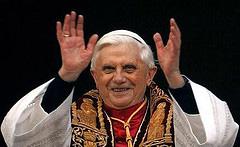Pope Benedict XVI Provides More Evidence that the Popes Did Not Have Primacy

Pope Benedict XVI
The following news item was of interest:
Pope: Leo the Great Defended the Primacy of Rome
Knew Its Role in Maintaining Church Unity
VATICAN CITY, MARCH 5, 2008 (Zenit.org).- Leo the Great promoted the primacy of Rome because he knew its necessary role in maintaining the unity of the Churches, says Benedict XVI.
The Pope said this today during the weekly general audience in Paul VI Hall, in which he dedicated his reflection to the figure of St. Leo the Great, whom Benedict XVI called “one of the greatest Pontiffs ever to have graced the See of Rome.”
“He is also the first pope of whom we have evidence of his preaching to the people who crowded around him during celebrations,” said the Holy Father.
Benedict XVI continued: “It is natural to think of him in the context of the general Wednesday audiences; an appointment that has become in the last decades, a normal and expected way of meeting with the faithful and with many other visitors from all over the world.”
St. Leo the Great was elected Pope in the year 440…
The Holy Father explained how during
Leo’s pontificate the Council of Chalcedon took place, “the most important assembly ever to be celebrated in the history of the Church,” which “affirmed the union in the one Person, without confusion and without separation, of the two natures, human and divine”.“It is evident,” Benedict XVI went on, “that the Pope felt the urgent responsibility of Peter’s Successor, whose role is unique in the Church, because ‘only to one Apostle was entrusted what was communicated to all the apostles.'”
The Pontiff said Leo the Great “managed to exercise such responsibilities, in the West like in the East, by intervening in various circumstances with prudence, determination and lucidity through his texts and his bound manuscripts. In so doing he demonstrated the importance of the Roman primacy then, as much as today, in order to effectively serve the communion that is a feature of the one and only Church of Christ.
Notice that Pope Benedict is admitting that Leo of the fifth century was the first pope to have such audiences and that he took actions possibly towards some type of primacy.
But the truth, as even Vatican-based Cardinal W. Kasper admits is, that the Roman Church did not have individual “apostolic succession” and knows that it cannot be proven historically:
As I see the problem and its possible solution, it is not a question of apostolic succession in the sense of an historical chain of laying on of hands running back through the centuries to one of the apostles; this would be a very mechanical and individualistic vision, which by the way historically could hardly be proved and ascertained…To stand in the apostolic succession is not a matter of an individual historical chainbut of collegial membership in a collegium… (Kasper, Cardinal Walter. Keynote speech from the Conference of the Society for Ecumenical Studies, the St. Alban’s Christian Study Centre and the Hertfordshire Newman Association at St. Alban’s Abbey, Hertfordshire, England, on May 17, 2003).
There were no bishops of Rome prior to the mid-second century and they were not considered as “Pope” until the end of the fourth century.
Also the fact that it was Emperor Constantine, and NOT a pope, who convened the first church council (Nicea 325 AD) and made his impression of Greco-Roman shows that the early “popes” had little influence outside of Rome. The fact that they sometimes tried to does NOT show that they had any Apostolic Succession as there is no proof that there ever was a “Bishop of Rome” until over a century after Christ’s death.
Furthermore, perhaps I should add here that Leo’s comments about Jesus were in biblical error (please see the article Jesus is God, But Was Made Man ).
The Roman Catholic Church simply does not have Apostolic Succession the way most of its followers seem to think.
Several articles of related interest may include:
The History of Early Christianity Are you aware that what most people believe is not what truly happened to the true Christian church? Do you know where the early church was based? Do you know what were the doctrines of the early church? Is your faith really based upon the truth or compromise?
What Do Roman Catholic Scholars Actually Teach About Early Church History? Although most believe that the Roman Catholic Church history teaches an unbroken line of succession of bishops beginning with Peter, with stories about most of them, Roman Catholic scholars know the truth of this matter. This eye-opening article is a must-read for any who really wants to know what Roman Catholic history actually admits about the early church.
Location of the Early Church: Another Look at Ephesus, Smyrna, and Rome What actually happened to the primitive Church? And did the Bible tell about this in advance?
Which Is Faithful: The Roman Catholic Church or the Living Church of God? Do you know that both groups shared a lot of the earliest teachings? Do you know which church changed? Do you know which group is most faithful to the teachings of the apostolic church? Which group best represents true Christianity? This documented article answers those questions.
Apostolic Succession What really happened? Did structure and beliefs change? Are many of the widely-held current understandings of this even possible? Did you know that Catholic scholars really do not believe that several of the claimed “apostolic sees” of the Orthodox have apostolic succession–despite the fact that the current pontiff himself seems to wish to ignore this view? Is there actually a true church that has ties to any of the apostles that is not part of the Catholic or Orthodox churches? Read this article if you truly are interested in the truth on this matter!
 |
Tweet |
|